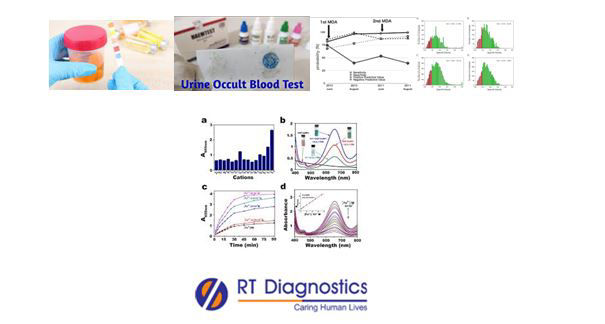Urine – Occult Blood:
Why Urine - Occult Blood Test?
CLINICAL INFORMATION
Occult blood is otherwise known as hematuria. Frank bleeding is not a common finding. The incidence of hematuria could be due to three causes such as systemic diseases involving kidneys (eg. Diabetes mellitus, hypertension etc), diseases involving renal parenchymal pathologies(eg. glomerulonephritis and its associated diseases) and diseases associated with abnormal urology or urologic diseases/disorders (eg. malignant tumour, urolithiasis, UTI etc). More than 5 RBCs per hpf is usually considered abnormal. While RBC casts are suggestive of glomerulotubular source of hematuria. Furthermore, the absence of RBCs and RBC casts despite a positive test result suggests hemoglobinuria and/or myoglobinuria. Detection of other cellular elements (WBCs, WBC casts) in urinary sediments suggests UTI, and hence further studies are needed for confirmation such as culture tests etc. Associated tests are also needed such as microscopic evaluation (i.emicroscopic hematuria, crystals, bacteria, protozoa) etc. Indications for urine occult blood – Based upon the past medical or surgical history (glomerular and extra-glomerular etiology) and physical evaluation conducted by a clinician, for further investigations, other auxiliary laboratory tests are ordered. Detection of occult blood by laboratory test is based on the peroxidatic activity of especially haemoglobin (also myoglobin). It catalyzes the reaction of peroxidase-chromogenortho-tolidine to form oxidized ortho-toludine. Thus positive occult blood in urine indicates cancer, kidney stones, renal pathology, UTI, benign prostatic hyperplasia (males) etc. While a positive test for occult means either hematuria, hemoglobinuria, myoglobinuria.Hematuria can be associated with certain abnormalities related to urogenital or genitourinary pathologies (associated with kidney, bladder, ureter) etc. Occult blood (micro-hematuria) in urine specimens can be seen under a microscope. Hence the cause of hematuria must be further explored (to find the cause) and examined to treat it. Some of the causes of hematuria are UTI, certain viral illnesses, pylonephritis, trauma to the bladder, heavy or vigorous exercises, sexual activities, kidney stones, kidney diseases, bladder cancer, inflammation to the kidneys, urethra, prostate, benign prostatic hyperplasia, bladder, PCOs, medications (such as anti-coagulant therapy, chemotherapy etc). Other causes include typhus, scurvy, purpura, nephritis, renal calculi, hemolytic toxins etc. Principle of this test (Mechanism of action) –
The dipstick test for blood is based on the peroxidase-like activity of haemoglobin. As the RBCs come in contact with the embedded dipstick, the erythrocytes get lysed and the haemoglobin is exposed. This catalyzes the liberation of oxygen from organic peroxide. Thus the tetra-methyl-benzidine as it gets an oxidized change in its colour occurs from orange to bluish-green. High-risk factors for hematuria include age (over 50 years), male (kidney stones), female (UTI), family history, recent infections, certain medications (NSAIDs like aspirin, penicillin etc), strenuous exercise etc. Complications due to untreated urine occult bleeding can lead to severe symptoms of dehydration, electrolyte imbalance etc. Certain factors may interfere with test results and yield either false positive or false negative occult blood test results. False-positive test results may be due to dehydration, exercise, hemoglobinuria, myoglobinuria, menstrual blood (in females), alkatoticurine (pH more than 9.0 etc. While some of the false-negative occult blood could result due to increased specific gravity, pH of urine (5.0 or less), proteinuria, medications such as Captopril, Vitamin C etc.Additional tests include CBC, Calprotectin test, immunochemical tests / Antigen tests, transferrin test for confirming anaemia, imaging studies etc. Other tests include spectroscopic studies etc.

General Instructions:
Sample Requirement: Specimen -Urine Sample
Test Preparation: None.
NOTE - Sample for specimen collections may vary based on the patient’s condition/cases according to the patient’s presenting complaints/signs or symptoms:
SPECIMEN REQUIREMENT (Special or Rare Cases) - As instructed and guided by Physician / Clinician / Pathologist / as per Laboratory’s requirements, according to procedures and protocols.
This Multi-Specialty Clinical Referral Laboratory RT DIAGNOSTICS provides precise and accurate tests with an extensive range of testing services to the medical centres to help in the diagnosis and identification of pathology in the test specimens for infectious diseases and also to evaluate the function of organ systems of the patient. It prevents further complications and helps to stabilize and restore health to near normalcy at the earliest without delay.



